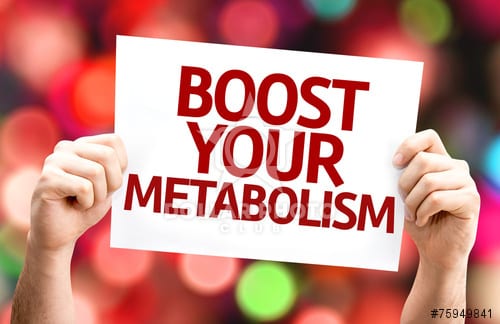You may have heard that a slow metabolism is linked to weight gain, but is weight loss truly dependent on metabolism? If you’ve been looking for the secret to how to burn calories, is revving up your metabolism the answer?
What is metabolism?
The metabolic process is a collection of chemical reactions that are continually happening within your body. Through this complex process, your body converts food (calories) to energy. Even at rest, your body requires energy to carry out basic functions such as breathing, circulating blood, growing and repairing cells, and more. The amount of energy (or number of calories) your body needs to maintain these basic functions is known as your basal metabolic rate (BMR), or metabolism.
What determines metabolic rate?
The rate at which your body burns calories at rest is dependent on several factors, including?
- Body size and composition. If you are larger or have more muscle, you will burn more calories than someone who is smaller or has less muscle.
- Men typically have less body fat and more muscle mass compared to women of the same age and weight.
- As we age, muscle mass tends to decrease while fat increases, slowing down the rate at which your body burns calories.
- The process by which your body digests, absorbs, transports and stores the food you eat into calories is known as thermogenesis. About 10 percent of the calories you consume are burned in this process of digestion and absorption.
- Physical activity. Any physical movement requires energy. The amount of activity or exercise you do each day plays a major role in how many calories your body burns on a day-to-day basis.
Metabolism and weight loss
Is metabolism directly linked to weight loss? The short answer: yes. And while a “faster” metabolism burns calories more quickly, it is not always true that a “slower” metabolism causes weight gain. Rather, the foods you eat and how much physical activity you do on a daily basis are more influential on weight gain or weight loss than the rate at which your body burns calories (metabolism).
How to burn calories
How quickly you gain or lose weight is dependent on a complex combination of factors, including genetics, hormones, what you eat, your environment, how much sleep you get, how much you exercise and your stress level. In order to burn more calories and lose weight, you must eat fewer calories than your body burns through metabolism.
Your body’s basal metabolic rate is responsible for burning about 70 percent of the calories you burn each day. While it is true that some people are born with a higher BMR than others, a “slow” BMR doesn’t mean you’re destined to be overweight. While there’s nothing you can do about many of the factors that determine metabolic rate, there are some changes you can make in your daily habits can help you burn more calories. Most weight loss programs are centered around the basic fact that you must burn more calories than you consume in order to lose weight.
Here are some helpful tips to help you burn more calories.
- Increase exercise. A healthy weight loss program includes a combination of cardio and strength training exercise. The American Heart Association recommends adults get at minimum, 150 minutes of moderately intense exercise each week. That means you should spend at least 30 minutes a day, five days a week exercising. If 30 minutes is too much at first, break your workouts into three 10-minute segments each day.
- Don’t skip strength training. Resistance and strength training exercises increase muscle mass so your body will burn calories more efficiently. At least two strength training workouts per week are recommended, including bodyweight exercises and weight lifting.
- Make small changes to increase physical activity. Look for ways to get more movement in your daily routine. Take the stairs instead of the elevator. Park at the back of the parking lot. Hold walking meetings at work. Walk or jog alongside your kids as they ride their bikes. Do bodyweight movements during the commercials while you’re watching your favorite show or sporting event.
- Get more sleep. It is a fact that sleep deprivation makes it difficult to manage blood sugar and resist cravings. Aim to get six to eight hours of sleep each night to help you maintain a healthy weight.
- Drink more water. Not only is water a no-calorie option that can help keep you feeling full and flush out toxins in your body, the process of thermogenesis warms the water you drink to body temperature, using calories to do so. The more water you drink the more calories you’ll burn through this process.
- Increase protein in your diet. Protein helps your body burn more calories at rest. By eating some protein with every meal or snack, you can keep your body burning calories all day. In addition to meat, you can also get protein from seafood, beans, eggs, nuts, dairy and soy.
- Don’t starve yourself. Yes, you must create an energy deficit in order to lose weight, but be careful not to create too much of a deficit or your body could kick into starvation mode and start storing calories instead of burning them.
- Drink coffee. To be clear, we’re not recommending a sugar-loaded specialty coffee drink, but a drinking a cup of black coffee (or coffee with a small amount of milk) can boost your metabolism and help you burn more calories.
Is it time to get rid of the extra weight you’ve been carrying around? Contact the weight loss doctors at First Baptist Medical Center today to learn more about the medical interventions available to help you lose weight reach your weight loss goals.




